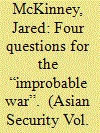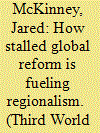|
|
|
Sort Order |
|
|
|
Items / Page
|
|
|
|
|
|
|
| Srl | Item |
| 1 |
ID:
143928


|
|
|
|
|
| Summary/Abstract |
“As long as the US holds tight to its values and solves its problems at home,” Andrew Nathan and Nathan Scobell have written in a well-regarded 2012 book, “it will be able to manage the rise of China.”1 This sentiment admirably expresses the long-standing consensus of the Washington, DC foreign policy elite: by using a combination of economic engagement, military balancing, and diplomatic pressure, the US can socialize Chinese elites while checking Chinese power. In such a scenario, China will rise, but it will rise within the existing international system. And even were China to consider violating contemporary norms—say, against the use of force to resolve disputes—the military power of the US and its allies would be overwhelmingly sufficient to deter, defend, or defeat the transgression. China’s rise, in short, need not threaten the status quo as long as the western powers deepen economic interdependence, preserve maritime supremacy, and maintain leadership of the international system.
|
|
|
|
|
|
|
|
|
|
|
|
|
|
|
|
| 2 |
ID:
157886


|
|
|
|
|
| Summary/Abstract |
In the Chinese view, the architecture of contemporary global governance – especially that of the Bretton Woods institutions – is flawed and in need of reform. Developing nations (like China), the argument runs, need to be given a role proportionate to their global economic influence. Since the Group of Twenty (G20) became a leaders’ summit in 2008, China has used the forum to push for such reform. But today, despite some supposed progress, reform has stalled. Recognising this fact, China is increasingly emphasising regional integration in its strategy for overcoming the middle-income trap. Global reform has not been abandoned, but – given its infeasibility – is no longer a short-term priority.
|
|
|
|
|
|
|
|
|
|
|
|
|
|
|
|
|
|
|
|
|